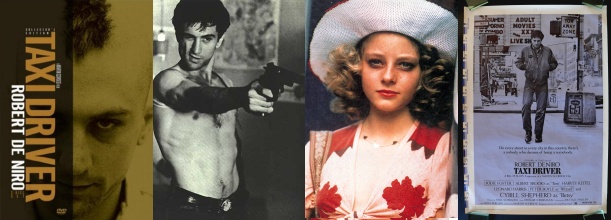Taxi Driver

Travis Bickle, a lonely, insomniac Vietnam veteran, takes on a job as a New York taxi driver to fill his empty nights. As he drives through the streets of the Big Apple, his anger at the dissolution around him grows. We witness the disintegration of Bickle’s sanity and his search for solace; first in political canvasser Betsy and then in an unconventional friendship with underage hooker Iris.
More than a quarter of a century on, what is it about Scorsese’s seminal film that endures? Although a product of its time, audiences watching it now are no less affected by the dark and disturbing currents that swirl across the screen in grimy shadow lit by lurid New York neon. Scorsese masterfully ratchets up the tension scene by scene, the underlying menace building and building until it is barely tolerable.

Of course, this is a film which stands or falls around the lead actor and Robert de Niro as eponymous taxi driver Travis Bickle gives the performance of a career – a role which, no matter how many Focker follow-ups he does, sets him on a podium as one of the greats. Bickle as an anti-hero is ideal, and De Niro totally inhabits his skin, creating an intensely disturbing yet compelling character. Dangerous and almost mad with loneliness, he also has a rigid, if warped, moral code. De Niro’s portrayal of a man on a slow spiral into deranged violence is pitch-perfect; right from the very beginning Bickle casts an ominous shadow across the screen, with the constant sense of a man balancing on a knife edge, ready to step off into the void. The tension created by Bickle’s presence only grows, until the audience is willing a breakdown, if only to release the pressure. The uncertainty of his actions is only matched by the certainty that there will be action – and it will not be pleasant.

It is not only De Niro that deserves celebration. Each and every performance is impeccable – and then there is the astounding Jodie Foster, who was only 14 when she played child prostitute Iris. The character’s pragmatic approach to selling her body creates some of the film’s most disturbing scenes, and Foster handles the role with complete and utter aplomb. Both De Niro and Foster, as well as the film itself, were nominated for Oscars, and it is startling to think they didn’t win. Also nominated was Bernard Herrmann’s original score, a fantastic use of music to heighten the threatening tones.

The other leading character is the city of New York; the grimy streets filled with pimps, whores, thieves, junkies, awash with fluorescent lights and violence. Bickle’s nocturnal journeys through this underbelly of America’s dream fuel his hatred of the city’s scum, until all is needed is a spark to ignite the idea that he should be the “rain to wash the trash off the sidewalk”. There have been several celluloid vigilantes, but are there any as ambivalent and unnerving as Travis Bickle? His increasing mental instability twinned with his firearm obsession don’t sit too easily with the hero label pinned on him by media at the end of the film. Is he a hero or a villain? Both or neither at all? Is he a psychopathic trope or (even scarier) an everyman? There are no comfortable answers to any of the questions that the film raises; just the way we like it.

Taxi Driver is an absorbing, uncompromising masterpiece of film that has lost none of its ability to discomfit. A true classic that deserves to be seen on the big screen, it feels as fresh and as shocking as the day it was made. http://credit-n.ru/offers-credit-card/ren-drive-365-credit-card.html http://credit-n.ru/offers-zaim/webbankir-online-zaim-na-kartu.html

And rightly so, taxi drivers are also entitled to prestige.